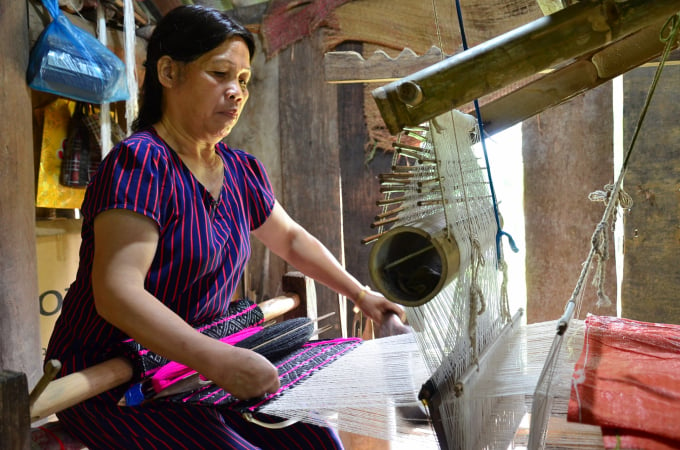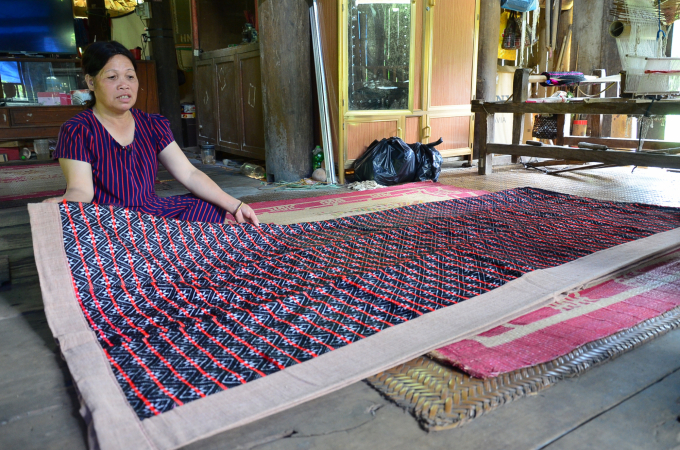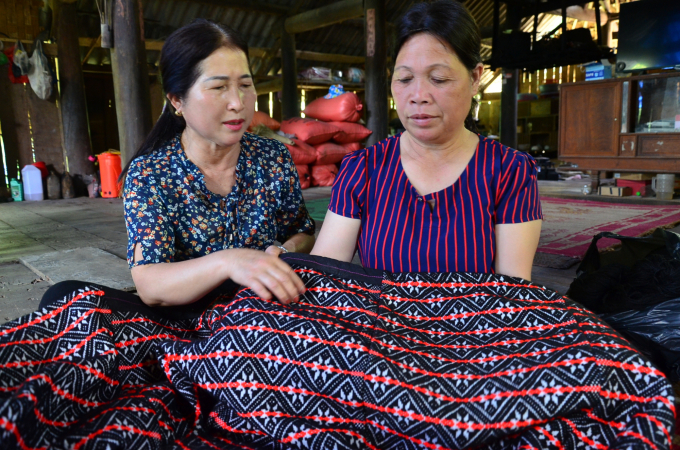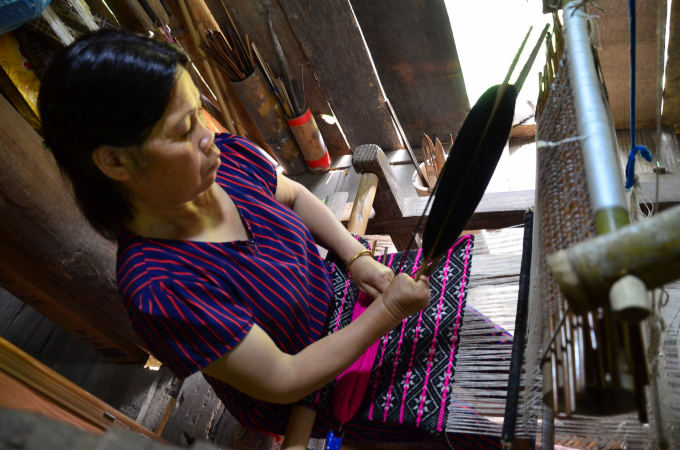June 17, 2025 | 19:28 GMT +7
June 17, 2025 | 19:28 GMT +7
Hotline: 0913.378.918
June 17, 2025 | 19:28 GMT +7
Hotline: 0913.378.918
When Nguyen Thi Y in Na Ban hamlet, Thuong Lam commune (Lam Binh district, Tuyen Quang province ) was born, her mother kept touching her right hand and she was devastated, it had no fingers like her other brothers. Her family was poor and she was disabled, so at the age of 15, Y could only go to first grade, had to struggle to learn to write with her left hand. Her dad encouraged: "Try to go to school so you can still learn the words". But she replied: "I go to school, I only have one hand, I'm so embarrassed, Dad!".
Without her right hand, she took firewood with her left hand, held the plow with her left hand, put the seedling on the amputated hand, then transplanted it with the left hand, clamped the sickle in the amputated hand and harvested the rice with her left hand, just like any other farmer. She went to the fields from the early morning until she could no longer see the grass before she stopped, went to the fields from when the trees were still wet with dew until she could no longer see the path before she stopped working. Some men in the neighborhood came to court her, but she refused: "My right hand is missing, so I cannot take on the role of a mother and a daughter-in-law".
When she was idling, sitting at home was sadder than a sitting duck. When she saw her mother's abandoned loom, she tried to sit down and weave. In the afternoon, her mother asked: "Hey, who weaved my loom like this?". She was embarrassed: "I weaved it!". Mother said: "When you weave, you have to change the stick to create the pattern". So the next day, at home, she took it off and practiced again.

Ms. Nguyen Thi Y works night and day by the loom weaving brocade. Photo: Duong Dinh Tuong.
In the past, Thuong Lam was famous for its vast cotton fields serving brocade weaving. Tay women and mothers taught their nieces and daughters from the age of 11, 12 how to roll cotton, sew thread and weave, but her mother did not dare to think that her handicapped daughter could learn the art. It takes only 7-8 days for the average person to weave a brocade, while it takes her more than a month. The first piece of cloth that she wove, she showed it off and was praised by her mother: "How did you weave such a beautiful brocade with only one hand?" and that kept her heart happy.
At first, she slowly learned to weave. Later, although she did not have a right hand, she was as fast as a normal person with both hands. Then an incident happened, her father died, her siblings quarreled, so she had to live separately in a bamboo hut built on a guest land. The loom, covered with dust, was no longer touched.
Ms. Ngo Thi Phin said: "In 2000, I was a foster kindergarten teacher, I went to mobilize children in the neighborhood to study and saw that every family abandoned their loom in the corner of the house, full of spider webs, so I asked them, "Why did you guys just give up on brocade weaving like that? Wherever I go, I don't see any patterns more beautiful than the ones weaved by the Tay ethnic group, their mind has embroidered these mountains, forests, fields, water bodies, crabs, snails ... ".

A blanket costing 4 million like this, Ms. Y has to weave for more than 1 month. Photo: Duong Dinh Tuong.
When going to Ms. Y's bamboo hut to mobilize her niece, who lives with her, to go to school, Ms. Phin sometimes sees Ms. Y sitting quietly crying. When I asked, I knew that the situation was dire, even the dilapidated hut was in danger of being removed, with nowhere to stay. Taking some nylon sheets to cover the tent from leaking, Ms. Phin comforted Ms. Y. Thanks to frequent exchanges, their sisterhood bond grew even stronger. At one point, Ms. Y confided: "I'm looking for a way to die by hanging". Ms. Phin had to give advice until she calmed down.
In 2011, the new district of Lam Binh was established, knowing that the government had an idea to restore the traditional weaving of the Tay people, Ms. Phin was very happy, decided to go on a trip through Vietnam, to many places with brocade products to figure out why they still maintain this art. She started by convincing Ms. Y: “Can you weave brocade again?”. Ms. Y agreed, so Ms. Phin went to Nam Dinh to import yarn because Thuong Lam's cotton business was stopped. After nearly 20 years of neglect, the patterns of the Tay ethnic group are still vividly displayed through Ms. Y's right hand with all fingers missing, causing Ms. Phin to hold the cloth and moved to tears.
"The brocade of the Tay people can be rough and hard at first, but after a while, the fabric softens, because it's all natural, even the colors are dyed from the bark of Melaleuca and Dracontomelon trees". Ms. Ngo Thi Phin is the leader of Thuong Lam's brocade weaving group.
Seeing Ms. Y weaving brocade, with a little money, people told Ms. Phin: "Let me do it with, I'm in the same situation, my husband has cancer" or: "My child is sick but I don't have any job". People gradually came to her place. These are women with difficult circumstances, including 5 dead husbands from cancer or seriously ill husbands. Ms. Phin has been the leader of Thuong Lam's brocade weaving group ever since.
However, at first, the products were very difficult to sell. She had to mobilize people who are preparing to marry their daughter, first by inviting Mr. Chau Cong Doan - Chairman of the Commune at the time: "Please buy two of my blankets for your daughter as a marriage gift. You can buy to encourage everyone else to buy it". The blanket at the time was very cheap, only at 300,000 VND, but along with its beautiful look, it was still warm from the Tay mother's love for her daughter.

Ms. Phin and Ms. Y checking the finished fabric. Photo: Duong Dinh Tuong.
Ms. Phin's store specializes in selling newborn and wedding goods, so whenever she sees a family preparing for a wedding, she invites them to buy it. "The blankets made by Tay people are very durable, they can be worn for the rest of their lives and even passed on to their descendants, they are also very comfortable because they absorb sweat and prevent sickness". After the wedding, when the couple has a child, she once again invites them: "The blanket (baby blanket) for children and they will never catch pneumonia because it's dyed with indigo, which is very good". The custom of the Tay people is that when a grandchild is one month old, the grandmother often gifts a sling to carry the baby around, she also makes a brocade sling for marketing. Or recently, she made brocade bags to replace nylon bags, ensuring environmental protection. People from outside Thuong Lam including Khuon Ha and Lang Can communes nearby also gradually came to purchase brocade.
Since 2014, when the homestay business began in Lam Binh, Ms. Phin brought brocade to introduce to tourists. Westerners buy for souvenirs, Vietnamese people buy for daily use, as gifts for partners near and far. Small bags cost 50,000 VND/piece, slings 200,000 VND/piece, blankets for children 400,000 VND/piece, pillows 400,000 VND/pair, mosquito nets 900,000 VND/piece, adult blankets 1.5-1.8 million with no stuffings, lined with cotton, 2.2 million.
Thuong Lam's brocade weaving group currently has 37 members, more than 20 of whom are in very difficult circumstances, with side jobs, they earn an average of 1.7 million/month. Brocade can be woven anywhere because when they go to any house to look after the sick and see a loom, they help each other weave, and in their free time, especially when it's raining, after dinner, at 4 a.m. -5 a.m when they can't sleep, sometimes the wife sings and weaves while her husband plays the flute.

Although her right hand has no fingers, Ms. Y is very skillful in her work. Photo: Duong Dinh Tuong.
“I am still helping the disadvantaged women of my hometown without pay, when I sell as much as I can, I give them all the profits. However, consumption of these products is still a bit difficult. Although my health is limited due to a stroke, I still travel everywhere to promote the Tay cultural identity through brocade products", Ms. Phin confided.
Ms. Y, 59 years old this year, currently lives with her grandchild in the stilthouse left by her parents in the mountains. Among the members of the group, she can make the most brocade because she rarely interacts with others and has few friends, so she sits by the loom all day.
She said, with such a disability, previously she went to the commune multiple times for governmental support, people refused although she said she could still work, she had no other choice. They asked: "Why did you wait until you're too old before getting support?".
She had to clarify the situation, after hearing her, the provincial officials were so angry: "She's lost all her fingers, how could she possibly work normally". So for the past 2 years, she has had a support system, each month she also gets a few extra hundred thousand, plus 2-3 million thanks to brocade weaving, enough to take care of her until old age.
Translated by Nguyen Hai Long
/2025/06/12/3721-2-202745_83.jpg)
(VAN) TH made an impression at Seoul Food 2025 with its line of natural beverages, paving the way for Vietnamese food products to enter the South Korean market.

(VAN) Soc Trang's success in rice exports stems from a strategy of developing fragrant and specialty rice cultivation areas and standardizing production toward low-emission practices.
/2025/06/11/1311-5-120811_839.jpg)
(VAN) The pig farming industry is facing the challenge of comprehensive restructuring to meet requirements for quality, safety, traceability, and market expansion both domestically and for export.

(VAN) Vietnam considers participating in ALGROALBA in order to expand agricultural production, coordinate the assessment and effective exploitation potential land.
/2025/06/05/5314-1-184727_407.jpg)
(VAN) From seemingly worthless fish scales and skin, enzymes and lactic ferments can transform by-products into peptides, opening a sustainable, effective business direction and elevating Vietnamese seafood.

(VAN) TTC AgriS and IFC signed a strategic partnership to develop a sustainable agricultural value chain, aiming to achieve the Net Zero target by 2035.

(VAN) Seafood by-products are opening a new path, combining green growth and technological innovation to enhance the industry's value.